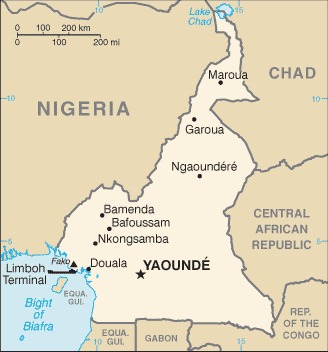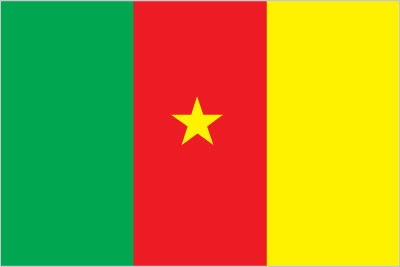
Cameroon

Brief Overview
Cameroon is a lower-middle-income country with a population of over 25 million (2018). Located along the Atlantic Ocean, it shares its borders with Chad, the Central African Republic (CAR), Equatorial Guinea, Gabon, and Nigeria. Two of its border regions with Nigeria (northwest and southwest) are Anglophone, while the rest of the country is Francophone.
At 475,442 square kilometres (183,569 sq mi), Cameroon is the world’s 53rd-largest country. … The country’s neighbours are Nigeria and the Atlantic Ocean to the west; Chad to the northeast; the Central African Republic to the east; and Equatorial Guinea, Gabon and the Republic of the Congo to the south.
Political Context
Cameroon’s ruling party, the Cameroon People’s Democratic Movement (CPDM), has long dominated the country’s political landscape, occupying 148 of 180 seats in the National Assembly and 81 of 100 in the Senate. In November 2018, disputed election results returned President Paul Biya to office. At 85 years old, Paul Biya, who has held power since 1982, is now serving his seventh term as the country’s president.
For many years now Cameroon has been grappling with attacks by Boko Haram in the Far North and a secessionist insurgency in the Anglophone regions. Since September 2017. This situation has displaced more than 500,000 people internally and claimed the lives of close to 400 civilians and over 200 military, gendarmerie, and police officers. Figures from the UN Refugee Agency (HCR) show that Cameroon is currently hosting over 401,213 refugees, primarily from the Central African Republic (289,982) and Nigeria (108,164).
Social Context
Because its poverty reduction rate is lagging behind its population growth rate, the overall number of poor in Cameroon increased by 12% to 8.1 million between 2007 and 2014, and poverty is increasingly concentrated, with 56% of poor living in the northern regions.

Republic of Cameroon
Capital: Yaounde
Population: 23.5 million
Area: 475,442 sq km (183,568 sq miles)
Languages: French, English, languages of Bantu, Semi-Bantu and Sudanic groups
Major religions: Christianity, Islam, Indigenous Beliefs
Life Expectancy: 56 years (men), 59 years (women)
Currency: CFA (Communaute Financiere Africaine) franc
Organization: African Union, United Nations, Common Wealth, World Bank

Economic Overview
Cameroon is the largest economy in the Central African Economic and Monetary Community (CEMAC), a region experiencing an economic crisis triggered by the steep fall in oil prices. Along with its CEMAC partners, Cameroon has therefore had to put fiscal adjustment measures in place to adjust to the terms of trade shock and restore macro-stability and confidence in the common currency.
Growth in Cameroon is expected to reach 4.3% this year. The rebound is driven by three factors: an increase in natural gas production, with a new liquefied natural gas (LNG) offshore terminal coming online; the slight downturn in the oil sector; and sustained momentum in the construction, industry, housing, and services sectors.
The World Bank’s Country Economic Memorandum, issued in April 2017, notes that if Cameroon is to become an upper-middle-income country by 2035, it will have to increase productivity and unleash the potential of its private sector.
Specifically, Cameroon’s real GDP will have to grow by roughly 8% (or 5.7% per capita) between 2015 to 2035, which in turn will require the investment share of GDP to increase from about 20% in 2015 to 30% in 2035, and productivity growth to reach 2% over the same period from its average zero growth rate over the past decade. These challenges, though daunting, can be met. The public expenditure review published by the World Bank in February 2018 proposes five ways to achieve these goals.
Development Challenges
Cameroon suffers from weak governance, hindering its development and ability to attract investment. It ranks 152 out of 180 countries in the 2018 Transparency International corruption perceptions index, and 166 out of 190 economies in the World Bank’s Doing Business 2019 report.
Physical Contacts of the Presidency
Name of Minister:
Address:
Telephone:
Fax:
Physical Contacts of the Prime Minister’s Office
Name of Minister:H.E DION NGUTE Joseph
Address:Down Town Yaounde, May 20 Boulevard
Telephone:(+237) 222 238 005
Fax:(+237) 222 235 735
Physical Contacts of the National Assembly
Name of Speaker of the House:Cavayé Yéguié Djibril
Address:YAOUNDE
Telephone:(237) 222 22 04 84
Fax:(237) 222 23 54 75
Physical Contacts of the Chief Of State and Cabinet Ministers
Name of Minister:
Address:
Telephone:
Fax:
Physical Contacts of the Ministry of Interior
Name of Minister:
Address:
Telephone:
Fax:
Physical Contacts of the Ministry of Justice
Name of Minister:Amadou Ali
Address: Yaounde – Cameroon
Telephone:(+237) 222 23 26 23,
Fax:
Physical Contacts of the Ministry of Foreign Affairs
Name of Minister:Mr. Lejeune Mbella Mbella
Address:Yaounde
Telephone:
Fax:
Physical Contacts of the Ministry of Women’s Affairs
Name of Minister:Marie-Thérèse Abena Ondoa (nee Obama)
Address:
Telephone:
Fax:
Physical Contacts of the National Human Rights Commission
Name of Minister:Dr Chemuta Divine BANDA,
Address: Yaounde
Telephone:+237 242 22 61 17
Fax:+237 242 22 60 82
Physical Contacts of the Police
Name of Inspector General:
Address:
Telephone:
Fax:
Physical Contacts of the Military
Name of Minister of Defence: Joseph Beti Assomo
Address:
Telephone:
Fax:
Important Information of Key Human Rights Issues in Cameroon
Prisons in Cameroon
Number Prisons in Cameroon:
Number Prisoners in Cameroon:
Secret Detention Centres:
Police Stations in Cameroon:
Signed the Constitutive Act of The African Union on: 28 February 2001
Ratified:09 November 2001
Instrument Deposited:19 April 2002
2. The Economic Community of Central African States (ECCAS); French: CommunautéÉconomique des États de l’Afrique Centrale, (CEEAC)
Signed:
Ratified:
Instrument Deposited:
Signed:
Ratified:
Instrument Deposited:
Signed:
Ratified:
Instrument Deposited:
Key Regional Human Rights & Governance InstrumentsSigned and Ratified
Signed: 23 July 1987
Ratified:20 June 1989
Instrument Deposited: 8 September 1989
Signed: 25 June 2006
Ratified:09 December 2014
Instrument Deposited: 17 August 2015
Signed: –
Ratified:-
Instrument Deposited:–
Signed: –
Ratified:-
Instrument Deposited: –
Signed: – 25 July 2006
Ratified:- 13 September 2012
Instrument Deposited: –28 December 2012
Signed: – 30 June 2008
Ratified:-
Instrument Deposited: –
Signed: –
Ratified:-24 August 2011
Instrument Deposited: –16 January 2012
Signed: –
Ratified:-
Instrument Deposited: –
Signed: –
Ratified:-
Instrument Deposited: –
Signed: –
Ratified:-6 April 2015
Instrument Deposited: –24 May /2017
Signed: –
Ratified:-
Instrument Deposited: –
12. African Charter on the Rights and Welfare of the Child
Signed: –
Ratified:-
Instrument Deposited: –
Signed: –
Ratified:-
Instrument Deposited:
Signed: –
Ratified:-
Instrument Deposited: –